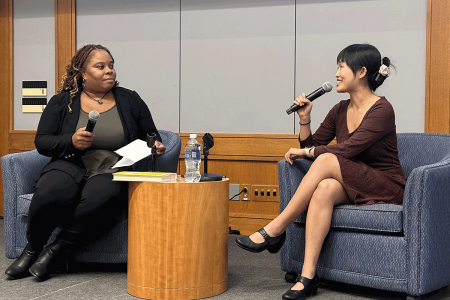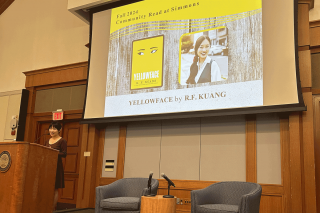This year’s Fall Community Read, organized by the Division of Student Engagement, Success, and Diversity, featured novelist and Yale Ph.D. student R.F. Kuang and her most recent book, Yellowface (New York: William Morrow/HarperCollins, 2023). The award-winning and #1 New York Times bestselling author discussed the importance of authorial voice, literary experimentation, and the craft of writing. Simmons University Trustee Emerita Eileen Friars ’72 helped fund this event, which concluded with a book signing.
“As an aspiring author myself, I am honored to introduce [the novel] Yellowface and author R.F. Kuang,” said Hiba Hussain ’28 during the introduction to Simmons’ 2024 Fall Community Read, held on October 7.
Rebecca F. Kuang is an award-winning and #1 New York Times bestselling author of five novels. She holds graduate degrees in Chinese Studies and Contemporary Chinese Studies from Cambridge and Oxford Universities, respectively, and is currently pursuing her doctorate in East Asian Languages and Literatures at Yale University.
“Yellowface is a brilliant, satirical story,” continued Hussain. The novel revolves around a young, struggling author named June Hayward. In a moment of desperation, Hayward steals the book manuscript of her deceased friend, Athena Liu, and publishes it as her own work. Adding to the ethical transgression, Hayward is White and Liu is Asian-American, and the stolen novel commemorates marginalized Chinese laborers during World War I.
Kuang’s book “delves into complex, controversial topics concerning race, heritage, publishing rights, and social media that we as readers are encouraged to reflect upon throughout the whole story,” said Hussain.
Finding her Voice(s)
“I have a confession to make,” said Kuang, as she assumed the podium. “The secret to writing Yellowface is that I have pretended to be other authors for most of my career.”
While Kuang never stole someone else’s unpublished manuscript or falsely claimed another racial identity, she admits to trying on “other writers’ literary identities and voices; taking up masks and putting them down, taking what was useful and leaving behind the rest.” As Kuang explained, “I turned impersonation and imitation into the core [techniques] of my creative practice.”
Recounting her early foray into publishing, Kuang recalled experiencing “one of the most troubling creative crises of my life” in her mid-twenties. She found success at a young age — she was just nineteen when she finished writing her first book, The Poppy War. However, being locked into a multiyear contract with a major publishing company for a fantasy genre trilogy (her first novel propelled the sequels The Dragon Republic and The Burning God), Kuang felt stifled. “I needed to do something [different], or I would have to quit writing forever,” she said.
While Kuang enjoys reading and writing fantasy novels, she acknowledged the limits of this particular genre. Fantasy is characterized by “quick pacing and high adrenalin,” and “these quick, bloody adventures do well in the market.” However, after completing The Poppy War trilogy, “I wanted to write something that did not sound like me at all,” Kuang said.
To create something entirely new, Kuang realized that she had to “escape the ghosts” of her old characters. She also had to reconcile a desire to diversify her voice with marketing pressures (via social media and branding) to spotlight a stable style for consumers. “We [i.e., authors] put ourselves into these little boxes so that customers will recognize us on the shelves,” explained Kuang. “And that is a perfectly fine way to go about your career. But it is not a way that I personally find fulfilling or sustainable. . . . Doing the same things over and over feels like creative death to me.”
Vocal Training and Imitation
“This is where the value of imitation comes in,” Kuang continued. According to her, the best way to master multiple genres is through the techniques of vocal training and imitation. In this context, vocal training means to read as widely as possible in a genre that you are hoping to write.
When drafting her first post-trilogy work, Babel: Or the Necessity of Violence: An Arcane History of the Oxford Translators’ Revolution (New York: HarperCollins, 2023), she experimented with adopting “another writer’s mask.” For Babel, Kuang turned to Victorian writers, including Charles Dickens, William Thackeray, and contemporary writers who have produced successful pastiches of this period. She presumed that the Victorians would be stilted and restrained. Instead, she found them “wild” and “naughty.”
Kuang explained that “humans do this [i.e., vocal training and modulation] naturally.” In other words, people adapt to their surroundings by adopting local accents and speech patterns. She encouraged people to “have fun with this technique” and “absorb the rhythms, tropes, and banter” that others have written.
Imitation constitutes another writing technique that Kuang recommends, which entails choosing an exemplary passage by another author and writing a parallel passage in one’s own words. “It will feel like cheating,” she said, “but the point is to push your comfort levels and to make you think about word combinations and sentence structures that you don’t normally use. This way, you push yourself to become a better author by trying to become that better author.”
To demonstrate the process of imitation, Kuang juxtaposed passages from other authors alongside her own Babel and Yellowface. For example, when writing parts of Yellowface, Kuang imitated sections from Kevin Wilson’s novel, Nothing to See Here (Ecco/HarperCollins, 2019). Wilson’s description of an impeccably palatial driveway inspired this passage from Yellowface:
Though I [protagonist June Hayward] feel the vicious kind of jealousy, too, watching Athena [Liu] talk about how much she adores her editor . . . I stare at Athena’s brown eyes, framed by those ridiculously large lashes that make her resemble a Disney forest animal, and I wonder, What is it like to be you? What is it like to be so impossibly perfect, to have everything good thing in the world? . . . I feel . . . a bizarre urge . . . to neatly peel her skin off her body like an orange and zip it up over myself.
While the main characters from Wilson’s and Kuang’s novels have little in common, both wrestle with toxic friendships and jealousy. “From Wilson, I learned how to access a person’s thought process in an unfiltered way,” said Kuang. “Both our protagonists are not written to be mentally ill. They are perfectly sane, and these are normal thoughts for any sane person to have . . . [but they suggest how] these emotional extremes can dominate any friendship that seems casual on the surface.”
Unfortunately, literary communities today often shun the practice of imitation, fearing plagiarism and lusting for originality. For Kuang, “conscious imitation does not have to be dishonest or appropriative. . . . It does not mean that we have to assume identities that don’t belong to us . . . [or produce] shoddy copies of our heroes.” Rather, this technique can help writers to discover their “unique literary voices.”
Speaking with the Simmons Community

Following Kuang’s presentation, Dr. Nakeisha Cody, Vice President of Student Success and Diversity, moderated a Q&A with the author and the Simmons community. This discussion covered a wide range of issues, including social media, AI, horror films, academic elitism, mother-daughter relations, and diasporic sensibility.
One of Kuang’s responses highlighted the importance of empathy: “I related to June [from Yellowface] in so many ways,” she said. Prior to publication, Kuang sent her manuscript to several writers, many of them women of color. “Everybody told me that they really sympathized with June. And I thought, fantastic, that means it worked!”
As Kuang explained, “June resembles my own anxieties and struggles. . . . and I have had similar disappointments with the publishing industry. . . . I really identify with June’s desperation, frustrations, and ambitions. The only difference between us is that June makes all the bad choices that I have only fantasized about making.” Kuang counseled writers in the audience to start from a place of empathy and love, which helps instill a character with complexity and nuance.
Above all, Kuang advises writers to prioritize good writing over social media stunts. “Being an influencer and being a writer are very different jobs . . . and you can’t be both,” she said. “What matters more than anything in the world is the craft and the work.”

